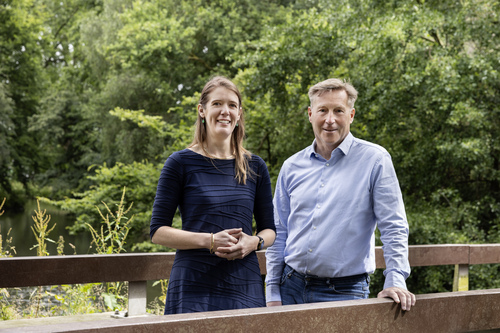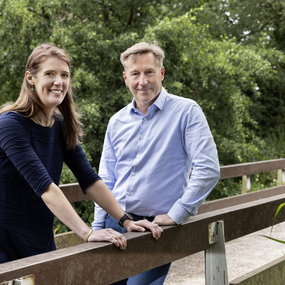
In the Investors Talk ("Beleggerspraat") series, board member Anne Kock and Chief Investment Officer Peter Kolthof take you into the special and important world of investing. They tell you why we invest as a pension fund, and in what, and how we view, for instance, socially responsible investing and investing in fossil fuels such as coal, oil and natural gas. This way, you get to learn about the world of investing. In this first interview, Anne and Peter tell us more about the basics of pensions and investing.
Anne and Peter work at Pensioenfonds PGB because they consider it an enterprising fund. A pension fund that seizes opportunities and chooses its own path. In addition, the new pension poses many challenges in their work.
Why do pension funds invest?
Anne: To maintain the value of the participants' money, and therefore their pensions, now and in the future. This means that, in the future, you can buy as much with your pension as you can today. You must take into account the fact that prices are rising, because if we would now set aside the money for later, you don't factor in price increases.
Peter: In the new pension, investing will take on an even more important role, or at least… it'll become more visible to participants. It really is a very difficult, but very important subject, which involves many difficult choices. That's why we want to be open and honest. Sometimes things go well, and sometimes they don’t, and in that case, participants need to know about it.
Anne, you work for the pension fund, Peter, you work for the implementing organisation. What can you tell us about that collaboration?
A: We think about our division of roles and how we do this together. The pension fund is more about strategy and policy. Among other things, Peter is responsible for the investments at the implementing organisation. That strategy and implementation are closely connected, so we do them together.
P: One cannot exist without the other. The pension fund thinks about what it wants. As an implementation organisation, we think about if and how we can achieve this. So we really need each other. Especially because Pensioenfonds PGB is the owner of the implementation organisation and we, as an implementation organisation, only have one customer. This means we have a strong relationship and I think that's quite unique.
A: That's why collaboration is easier and why it can flow into one even more seamlessly. We also want the same thing, namely, to offer our participants the best possible pension.

Why is it important that people know about investing?
A: Because it's their money that we invest with. It's not our money, but the participants'. And we need to take good care of it. We always keep that in mind, in fact, it's the most important starting point for our investments. This is also stated in our investment policy. We also have a sustainable investment policy, which not only explains how we invest, but also how we think about sustainability.
P: This policy didn't come out of the blue, we regularly ask our participants for their opinion. That's quite tricky, because we have participants from 16 different sectors: from sea fishing to the travel industry, and from graphics to the wholesale of flowers and plants. That's a cross-section of the whole of the Netherlands. And there are as many opinions as people. So it's not always easy to make policy based on those results. We also have to deal with laws and regulations. For instance, we're not allowed to invest in certain weapons, such as cluster munitions. And we also don't want to invest in some things, because we think that's really inappropriate, like the tobacco industry or child labour.
Sustainable sounds good, but do you get the highest return on investment?
A: Sustainability doesn't have to be at the expense of return on investment. For all our investments, we weigh the four factors of sustainability, costs, return and risk against each other. Climate change, for instance, could pose a major risk to our investments. We take this into account in our sustainable investment policy. Sometimes, we make a choice that may not immediately yield the highest results, but does contribute to a liveable world. Also because that suits our participants.
P: So it doesn't have to be mutually exclusive in the long term. Sustainability isn't always at the expense of return on investment. Sometimes, you can see even in the short term that the risks of a sustainable investment are more limited.
A: We want the best possible pension in a liveable world, so we have to make different choices. Where possible, we try to focus on things that make the world a better place. Because if the world isn't liveable, what good is a good pension?
P: You can't categorically say that a sustainable investment yields less or perhaps even more. There's a relationship between the sustainability problems we see now and how we deal with them, and the future value of companies. We really try to focus on improving the world, so we don't necessarily rule out everything that's not green enough but sometimes, we continue to invest in order to continue the dialogue. Anne wrote a column about this recently.
Can participants influence how you invest their money?
A: Absolutely! We want them to, even. When we invest, we take their wishes into account. That's why we regularly ask how they want us to invest for them and which themes they consider important. Studies among our participants in 2023 showed that no less than 70% think it's important that we invest in a socially responsible way. And that they find the themes of climate, biodiversity and nutrition very important. 5% of our participants consider return on investment to be the most important thing. It's up to us to clearly explain why socially responsible investing is so incredibly important. Another study last year was about how much risk our participants can and want to take. Based on that study, we can then determine which investments to make. Peter and I would like to tell you more about the outcomes in the next part of Investors Talk.

Anne Kock
Anne Kock (45) has been a director at Pensioenfonds PGB for a year now. She deals with everything regarding the shares and the financial situation of the fund. She is chairman of the balance sheet management committee and also pays a lot of attention to socially responsible investing. Anne has been active in the financial world for a long time, including as a supervisor at De Nederlandsche Bank. Because she has had many different positions, she views the topics on the board table from various angles. She lives with her husband and three children in Haarlem. In her free time she likes to go cycling, running or surfing.

Peter Kolthof
Peter Kolthof (57) is Chief Investment Officer at PGB Pensioendiensten, the implementing organisation of Pensioenfonds PGB. This means he is responsible for all investments and everything related to that. He spends a large part of his working life working for or at pension funds, including Shell Pension Fund. He has been working at PGB Pensioendiensten since 2020. Peter lives in The Hague and he and his wife have a son and a daughter. In his free time he is the chairman of rugby club Hoek van Holland.